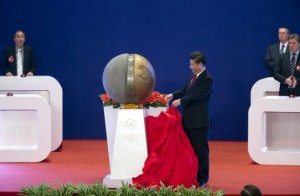China’s President Xi Jinping has launched the Asian Infrastructure Investment Bank (AIIB), an international development bank seen as a rival to the Bretton Woods institutions like the World Bank. With this bank, China is seeking to change the unwritten rules of global development finance.
The bank was launched on January 16. Despite facing stiff resistance and opposition from Washington, US allies including Australia, Britain, German, Italy, the Philippines and South Korea have agreed to join AIIB. Many analysts view it as a recognition of China’s growing economic clout. China is the largest stakeholder of AIIB with 26.06 per cent voting shares, followed by India which is the second-largest with 7.5 per cent, Russia is the third largest with 5.93 per cent and Germany is the fourth largest with 4.5 per cent.
“Asia’s financing needs for basic infrastructure are absolutely enormous,” Mr Xi said at the inaugural speech. The bank would aim to invest in projects that were “high-quality, low-cost”, he added.
“In order for Asia to continue to be the most dynamic region for global growth, it needs to invest in infrastructure and connectivity,” Premier Li Keqiang said. The AIIB aims to lend $10 billion-$15 billion a year for the first five or six years. The bank is expected to become fully operational in the second quarter of 2016.
“We already have a very good pipeline of co-financing projects (with other international development banks) and stand alone projects,” AIIB president Jin Liqun said. Focusing on lending loans, Mr Liqun said that while loans would be made in US dollars, the bank may raise capital in other currencies including the euro and yuan.
India fails to secure vice presidency
In a minor setback for India, it failed to secure the institution’s vice presidency. India asserted that Beijing has no veto rights despite having a say in its functioning. “India could not press for the vice presidency as AIIB decided to hire meritorious candidates for such posts, instead of allotting it to countries based on shareholding,” Dinesh Sharma, Additional Secretary, Ministry of Finance, said.
The AIIB is expected to provide development finance to Asia’s third largest economy which needs at least $1 trillion to bolster its infrastructure. The AIIB will have an initial authorized capital of $100 billion. The Asian countries have contributed up to 75 per cent of the total capital. With the AIIB designed to fund Asian energy, transport and major infrastructure projects across the continents, India would seek to secure financial assistance to strengthen its infrastructure and meet its energy requirements as well.
Mr Xi had also announced that Beijing would add $ 50 million towards a fund to promote infrastructure development projects in less developed countries. AIIB plans to disburse funds up to $1.2 billion or infrastructure projects in its first year of operations. India is expected to receive a sizeable amount of financial assistance from AIIB.
Author Profile
- India Writes Network (www.indiawrites.org) is an emerging think tank and a media-publishing company focused on international affairs & the India Story. Centre for Global India Insights is the research arm of India Writes Network. To subscribe to India and the World, write to editor@indiawrites.org. A venture of TGII Media Private Limited, a leading media, publishing and consultancy company, IWN has carved a niche for balanced and exhaustive reporting and analysis of international affairs. Eminent personalities, politicians, diplomats, authors, strategy gurus and news-makers have contributed to India Writes Network, as also “India and the World,” a magazine focused on global affairs.
Latest entries
 DiplomacyJanuary 5, 2026India walks diplomatic tightrope over US operation in Venezuela
DiplomacyJanuary 5, 2026India walks diplomatic tightrope over US operation in Venezuela India and the WorldNovember 26, 2025G20@20: Africa’s Moment – The Once and Future World Order
India and the WorldNovember 26, 2025G20@20: Africa’s Moment – The Once and Future World Order DiplomacyOctober 4, 2025UNGA Resolution 2758 Must Not Be Distorted, One-China Principle Brooks No Challenge
DiplomacyOctober 4, 2025UNGA Resolution 2758 Must Not Be Distorted, One-China Principle Brooks No Challenge India and the WorldJuly 26, 2025MPs, diplomats laud Operation Sindoor, call for national unity to combat Pakistan-sponsored terror
India and the WorldJuly 26, 2025MPs, diplomats laud Operation Sindoor, call for national unity to combat Pakistan-sponsored terror








